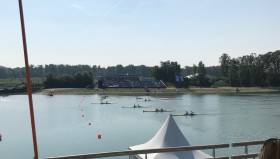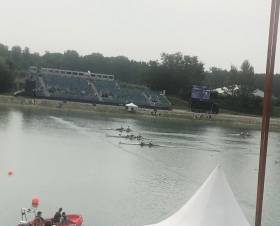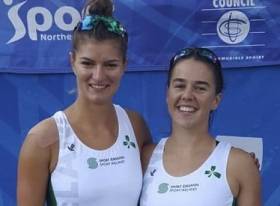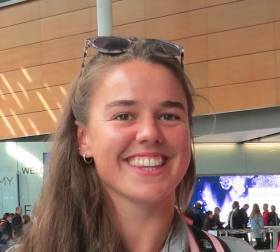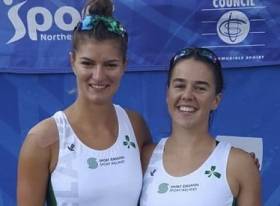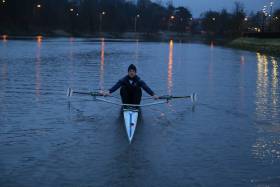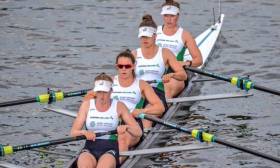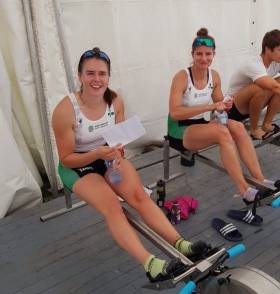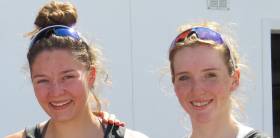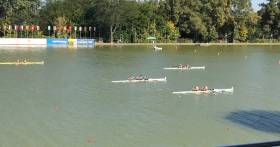Displaying items by tag: Aileen Crowley
Dukarska and Crowley Take Olympic Place For Ireland Pair
#Rowing: Monika Dukarska and Aileen Crowley booked another place for Ireland at the Tokyo Olympic Games this morning. They took second in the pairs B Final at the World Championships in Linz, well inside the top five which would have qualified the boat.
They led early on, but were passed by Romania in the third quarter. As they field chasing the Olympic spots closed, Ireland clung on to second.
(Irish interest)
Women
Pair - B Final (First Five book Olympic places for boat): 1 Romania 7:18.88, 2 Ireland (A Crowley, M Dukarska) 7:20.68.
Lightweight Double Sculls - C Final (Places 13 to 18) 1 China 7:00.82; 5 Ireland (A Casey, D Walsh) 7:10.52.
Thrilling Semi-Final Win By O'Donovan and McCarthy Sends Ireland Boat to Olympic Games
#Rowing: Ireland's first boat qualified for the 2020 Olympic Games is the lightweight men's double. Fintan McCarthy and Paul O'Donovan won in a thrilling semi-final here in Linz-Ottensmeim to take an A Final place at the World Championships and land a berth for the boat in Tokyo.
This was classic Paul O'Donovan. He gelled with his new partner, McCarthy, to produce a perfectly-judged finish which pushed Germany into second - by 13 hundredths of a second. Norway, like Ireland, had watched Germany and Australia do the early work, then closed on them in the final stages. The Norway crew of Are Strandli and Kris Brun, who were bronze medallists behind Ireland's silver in Rio 2016, produced the fastest finish of all to take third. Australia fell back to fifth.
All six A Finalists and the eventual winner of the B Final qualify boats for Tokyo 2020.
The Ireland women's pair of Aileen Crowley and Monika Dukarska will have to make their way through the B Final (placing fifth or better) if they are to qualify the boat for the Olympics. They finished fourth in a hotly-contested semi-final. New Zealand won with a commanding performance; the United States forced their way into second; the battle was joined between Ireland and fast-finishing Italy, who took the crucial third place.
World Rowing Championships, Linz-Ottensheim, Austria - Day Five (Irish interest)
Men
Lightweight Double Sculls - A/B Semi-Final Two (First Three to A Final; rest to B Final): 1 Ireland (F McCarthy, P O'Donovan) 6:13.46, 2 Germany 6:13.59, 3 Norway 6:14.15.
Women
Pair - A/B Semi-Final Two (First Three to A Final; rest to B Final): 1 New Zealand 6:57.92, 2 United States 7:01.78, 3 Italy 7:01.80; 4 Ireland (A Crowley, M Dukarska) 7:03.05.
#Rowing: Monika Dukarska and Aileen Crowley kept the good buzz around Ireland performances going in Linz-Ottensheim, winning a battle with Italy to take second in the pairs quarter-final at the World Championships. The Australian pair of Jessica Morrison and Annabelle McIntyre opened an early lead and won by a big margin. Italy and Ireland moved into clear second and third spots, but it took a fight-out coming up to the line to decide it. All three crews qualified for the semi-finals, but Ireland looked steady and strong and finished out well to secure a better lane draw.
World Rowing Championships, Linz-Ottensheim, Austria, Day Four (Irish interest)
Women
Pair - Quarter-Final Two (First Three to A/B Semi-Finals; rest to C/D Semi-Finals): 1 Australia 7:08.74, 2 Ireland (A Crowley, M Dukarska) 7:12.51, 3 Italy 7:13.11.
Pararowing: Women's PR Two Single Sculls, Preliminary Race: 1 Australia (K Ross) 9:24.99; 3 Ireland (K O'Brien) 9:52.13.
Women's Pair Straight Through but O'Donovan and O'Driscoll Must Go Again at World Championships
#Rowing: Monika Dukarska and Aileen Crowley took an encouraging second place in their heat as they qualified for the quarter finals in the women’s pair at the World Rowing Championships in Linz, Austria. The United States looked to have the win wrapped up, but Ireland raced to the line and pushed them at the finish.
Mark O’Donovan and Shane O’Driscoll finished sixth in their heat of the men’s pair. They were not in the mix for the top-four placing which would have seen them directly into the quarter-finals, and must compete in a repechage.
World Rowing Championships, Linz, Austria, Day One (Irish interest)
Men
Pair – Heat One (First Four to Quarter-Finals; rest to Repechage):
6 Ireland (M O’Donovan, S O’Driscoll) 6:50.51.
Women
Pair – Heat Four (First Four to Quarter-Finals; rest to Repechage):
2 Ireland (A Crowley, M Dukarska) 7:13.30
Ireland's Dukarska and Crowley Sixth at Rotterdam World Cup
#Rowing: Ireland's Aileen Crowley and Monika Dukarska took sixth in the A Final of the women's pairs at the World Cup Regatta in Rotterdam. Ireland featured well in the early stages, but Australia and New Zealand moved away. They would finish in that order after a good battle. Britain took the bronze. Ireland and Spain battled for fifth, with Spain taking it by 1.63 seconds.
Lydia Heaphy and Denise Walsh finished sixth in their B Final of the lightweight double sculls, to take 12th overall.
World Cup Regatta, Rotterdam, Day Three (Irish interest)
Women
Pair - A Final: 1 Australia 7:26.15, 2 New Zealand 7:27.57, 3 Britain 7:40.51; Ireland (A Crowley, M Dukarska) 7:50.08.
Lightweight Double Sculls - B Final (places 7 to 12): 6 Ireland (L Heaphy, D Walsh) 7:45.98.
Irish Crews Progress to A Finals at World Cup Regatta
#Rowing: Ireland took three A Final places from their first three races at the World Cup Regatta in Rotterdam this morning.
Philip Doyle and Ronan Byrne, the Ireland men's double, won their race. They took the lead and held it right through. Germany were their closest challengers, while Australia One finished well to to take the third qualification place.
The Ireland women's pair of Monika Dukarska and Aileen Crowley and lightweight single sculler Gary O'Donovan also qualified for A Finals.
The pair took the race to the other crews and led at 1500 metres. Spain and Romania covered the final 500 metres with real pace, but while Romania passed Ireland to win, Dukarska and Crowley came home ahead of Spain, who took the third qualification spot.
Gary O'Donovan finished fast in the semi-final to take second. He had been third for much of the contest. However, Jake McCarthy fell just short, taking fourth. He is set for a B Final.
Ireland Four To Compete in B Final at World Cup Rowing
#Rowing: The Ireland women’s four are set for a B Final on Sunday after finishing sixth in their semi-final at the World Cup Regatta in Poznan. Australia beat the United States One crew after an exciting contest in this semi-final, with China producing good finish speed to take third – and a place in the A Final – from New Zealand.
Ireland’s crew of Tara Hanlon, Monika Dukarska, Aileen Crowley and Emily Hegarty were fifth at halfway, over a length off the top-four, and finished behind Britain Two, who took fifth.
World Cup Regatta, Poznan, Poland – Day Two (Irish interest)
Women
Four – Semi-Final One (First Three to A Final; rest to B Final): 1 Australia 6:54.54, 2 United States One 6:55.52, 3 China 6:55.87; 6 Ireland (T Hanlon, M Dukarska, A Crowley, E Hegarty) 7:08.16.
Pair – Semi-Final One (First Three to A Final; rest to B Final): 1 New Zealand 7:32.18, 2 Italy One 7:35.99, 3 China One 7:36.43; 6 Ireland (C Feerick, E Lambe) 7:51.17.
Ireland Women's Four Finish Well and Nail Semi-Final Place
#Rowing: Ireland’s women’s four joined the women’s pair in the semi-finals of the World Cup regatta in Poland. The top three crews from the fours repechage qualified, but Ireland sat fifth at halfway. Canada moved away and opened a small lead; Ireland sat fourth with 500 metres to go. Croatia, Ireland and Britain Two finished best to take the top three places.
World Cup Regatta, Poznan, Poland, Day One (Irish interest)
Women
Four
Heat One (First Three to A/B Semi-Finals; rest to Repechage): 1 Australia 6:32.50, 2 United States Two 6:33.57, 3 Britain 6:35.69; 4 Ireland (T Hanlon, M Dukarska, A Crowley, E Hegarty) 6:38.44. Repechage (First Three to A/B Semi-Final; rest to C Final):
1 Croatia 6:47.12, 2 Ireland 6:47.49, 3 Britain Two 6:48.19.
Pair
Heat Two (Winner to A/B Semi-Final; rest to Repechages): 1 Italy Two 7:07.10; 2 China Two 7:09.55, 3 Ireland (E Lambe, C Feerick) 7:10.31. Repechage One (First Two to A/B Semi-Final; next two to C Final; rest to D Final): 1 United States One 7:15.35, 2 Ireland 7:19.33; 3 Canada One 7:26.52.
Ireland Four Bound for World Cup Repechage in Poznan
#Rowing: The Ireland women’s four took fourth in their heat, missing out on direct qualification for the semi-final, at the World Cup Regatta in Poland this morning. The crew of Tara Hanlon, Monika Dukarska, Aileen Crowley and Emily Hegarty will compete in a repechage later today.
Australia and the United States Two fought it out for the win, with Australia taking top spot. Ireland and Britain battled for the third and final qualification spot, which Britain took.
World Cup Regatta, Poznan, Poland, Day One (Irish interest)
Women
Four
Heat One (First Three to A/B Semi-Finals; rest to Repechages): 1 Australia 6:32.50, 2 United States Two 6:33.57, 3 Britain 6:35.69; 4 Ireland (T Hanlon, M Dukarska, A Crowley, E Hegarty) 6:38.44.
Pair
Heat Two (Winner to A/B Semi-Final; rest to Repechages): 1 Italy Two 7:07.10; 2 China Two 7:09.55, 3 Ireland (E Lambe, C Feerick) 7:10.31.
Dukarska and Crowley Win C Final at World Rowing
#Rowing: Ireland started the final day of the World Rowing Championships in Bulgaria in winning fashion. Monika Dukarska and Aileen Crowley dominated their C Final, winning by a length from Chile. This places the Ireland crew 13th in the world.
The strong winds prompted the organisers to redraw the lanes. The water was also visibly choppier than in recent days.
World Rowing Championships, Plovdiv, Bulgaria, Day Eight (Irish interest):
Women
Double Sculls – C Final (Places 13 to 18): 1 Ireland (M Dukarska, A Crowley) 6:54.55, 2 Chile 6:57.29, 3 Italy 6:58.17.



























